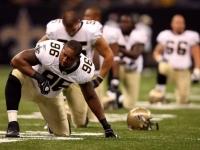BOB GARFIELD: In early 2010, the Wall Street Journal did some investigative football game watching and came up with a shocking revelation. Having sat in front of four NFL football games with stopwatches in their hands and having broken down every second of the broadcasts to determine what viewers actually see during a three-hour plus game, the Journal concluded that after the cheerleader shots and the announcer-in- the-booth shots and the crowd-panning shots, viewers see a grand total of 11 minutes of football, [LAUGHS] 11 minutes!
For fans, the study simply confirmed that TV football is much more than a recording of a game. Instead, the mere game is a point of departure for an entire narrative, a story told with interviews and narration, and a vast variety of shots. After the Journal study came out, I spoke with Bob Fishman, a legendary game director for CBS Sports. He told me that the story kind of missed the point.
BOB FISHMAN: I would love it to be 11 minutes. I'd show up, have a cup of coffee, do 11 minutes and go home and get paid for it. But it takes a tremendous amount of preparation. And then, obviously, during the telecast what goes on in the TV truck is something that the viewers don't get to see, but that’s a show in itself.
BOB GARFIELD: You are in a tractor-trailer parked underneath or outside the stadium. There are, I guess, a lot of monitors arrayed in front of you. What are you doing during the course of a game?
BOB FISHMAN: My job basically is to decide what you, the viewers, see at home. And we have an array of cameras, we have an array of angles, and it’s constant, nonstop calling of shots and telling my camera crew what I want on every particular play.
BOB GARFIELD: So what would it sound like? Just, if we could isolate your voice from everything else that was going on in the truck, what would we hear coming out of your mouth during a part of the game where, you know, there’s actual plays in progress?
BOB FISHMAN: Well, let's take the opening kickoff, for example. I might say something like, “Camera one return man, stand by camera two. Camera three, give me the far side coach. Camera six, I want you to give me the near side coach. Now the ball is kicked. Take two, run-back happens.” And I might say, “Three close-up, linebacker, take three. Four, give me a defensive coordinator. Take four. Camera two, get back to so-and-so.” And then it is a constant flow of information that, that I'm giving to my camera crew.
BOB GARFIELD: I don't know how many cameras you have on various angles at the kickoff but after the play is over, let's just say the return man took the ball five yards deep in the end zone, ignored his teammate who was trying to tell him to keep it in the end zone for the touchback, and ran out and got only to the 12, are you telling any cameraman to make sure he follows the guy to the bench to see if the special team’s coach chews him out?
BOB FISHMAN: Reactions is a big part of what we do because as a director, and I'm only speaking for myself, I think the emotional part of the game is kind of interesting. You know, we have a thing in our business called, you know, “goats and heroes.” There’s the guy who’s doing well on a play and there’s always a guy who’s screwing up on the play, and those reactions we weave in and out of a broadcast. So in the case of what you just proposed, a guy is supposed to kneel down to his teammate, and you clearly see the teammate saying, “Stay there, stay there” and he runs out. I need a reaction of the coach, of the special team’s coach, whatever, and the player going to the sideline.
BOB GARFIELD: In those briefings that coaches give network crews in the days before the game, they apparently sometimes say, we are going to run such-and-such a specific play to this receiver or, or this back because we have seen such-and-such a weakness in the films. I got to ask you if in, let's say, the Steelers-Ravens game, if the Saturday before the game the Ravens ever try to, you know, take you out for drinks to find out what the Steelers told you –
[FISHMAN LAUGHS]
- in the pre-game briefing. [LAUGHS]
BOB FISHMAN: Never happened. If we know a certain player is not gonna play, he’s listed as questionable, and we are told he’s really like out of the game - and sometimes that we will be told that –
BOB GARFIELD: Mm-hmm.
BOB FISHMAN: - we would never share that information with the other team. If they don't say it’s off the record, it’s on the record. But as far as giving team information and injury information, and we're gonna run a flea flicker on the first play, that is absolutely never shared with anybody, and nobody is asking to go out and have drinks with us. [LAUGHS]
BOB GARFIELD: Bob, thank you so much for joining us.
BOB FISHMAN: It’s been my pleasure. I, I enjoyed talking to you.
BOB GARFIELD: Bob Fishman is a game director for CBS Sports.
